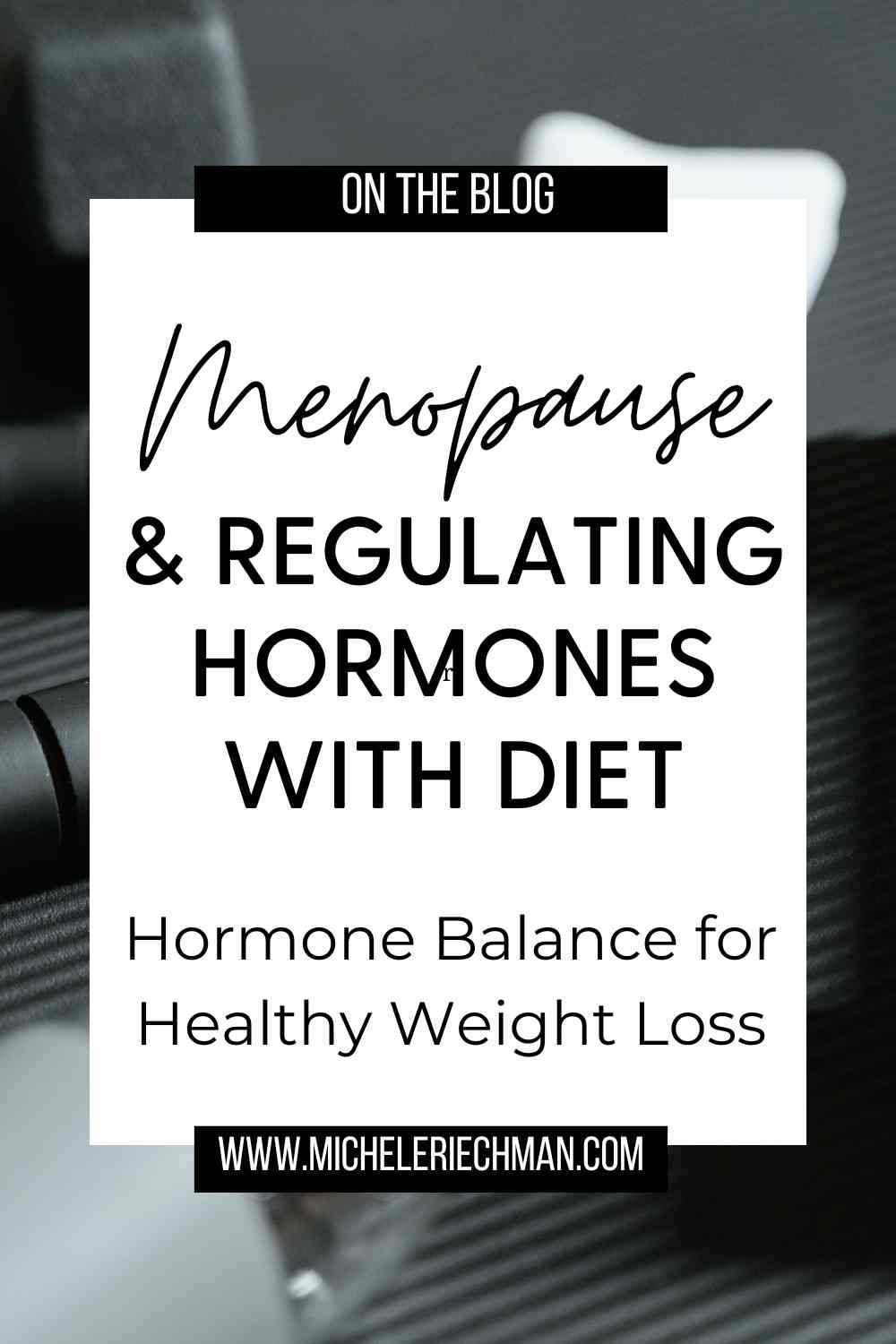Regulating Hormones With Diet {During Menopause for Weight Loss & Health}
Do you feel like as you are heading into menopause your hormones are all over the place?
Wondering if food can affect your hormones?
Are you curious about what you can do to help balance your hormones in menopause?
Menopause is a natural transition bringing changes in hormones, which can affect weight and health.
Although some changes may be unavoidable, there are ways to help avoid weight gain and improve health through diet and lifestyle changes.
Tune in as I share the ways that diet can help to regulate hormones and promote weight loss during menopause.
In this episode I discuss:
What is perimenopause and menopause?
Perimenopause is the transition period that women go through before menopause. It usually begins 2-12 years before menopause which is the point in time when a woman has not had a menstrual period for 12 consecutive months. During perimenopause, progesterone drops and estrogen is up and down, causing irregular menstrual cycles and symptoms such as hot flashes, night sweats, mood changes, vaginal dryness, and sleep disturbances.
Menopause is a natural biological process that marks the end of a woman's reproductive years. It typically occurs between the ages of 45 and 55, although it can occur earlier or later. Menopause is diagnosed when a woman has not had a menstrual period for 12 consecutive months, and it is caused by the natural decline in ovarian function that occurs as women age. Symptoms of menopause can include hot flashes, night sweats, mood changes, vaginal dryness, and sleep disturbances, and they can be managed with lifestyle changes, hormone therapy, or other treatments.
What hormone changes are happening during perimenopause and menopause?
During perimenopause, the levels of estrogen and progesterone in a woman's body start to fluctuate and decrease, causing changes in the menstrual cycle and other symptoms. Estrogen levels can vary greatly during this time, but overall they tend to decline gradually. However, there may be some surges in estrogen levels at times, which can cause irregular bleeding or spotting.
Progesterone levels also decline during perimenopause, but they may drop more sharply than estrogen levels. This can lead to irregular menstrual cycles, heavier or lighter periods, and other symptoms.
As menopause approaches and the ovaries stop releasing eggs, the levels of both estrogen and progesterone decrease significantly. After menopause, the levels of these hormones remain low, with estrogen levels being only about one-tenth of what they were before menopause. This decline in hormones can cause a range of physical and emotional changes, including hot flashes, night sweats, vaginal dryness, mood swings, and other symptoms.
Can menopause cause blood sugar problems?
Yes, menopause can cause changes in blood sugar levels and potentially lead to blood sugar problems, particularly for women who are at higher risk for diabetes. During menopause, the decline in estrogen levels can cause insulin resistance, which means the body is less able to use insulin effectively to regulate blood sugar levels. This can lead to high blood sugar levels and an increased risk of developing type 2 diabetes.
In addition, menopause can cause weight gain, particularly in the abdominal area, which can also contribute to insulin resistance and higher blood sugar levels. Other symptoms of menopause, such as hot flashes and sleep disturbances, can also affect blood sugar levels by causing stress and disrupting sleep patterns.
It's important for women going through menopause to be aware of these potential risks and to take steps to manage their blood sugar levels. This can include maintaining a healthy diet and regular exercise routine, monitoring blood sugar levels regularly, and talking to a healthcare provider about any concerns or symptoms that arise.
What is insulin resistance?
Insulin resistance is a condition in which the body's cells become less responsive to insulin, a hormone produced by the pancreas that helps regulate blood sugar levels. When insulin resistance occurs, the body requires higher levels of insulin to keep blood sugar levels within a normal range. If the pancreas cannot produce enough insulin to compensate for the resistance, blood sugar levels can rise, leading to a condition known as prediabetes or eventually type 2 diabetes.
Insulin resistance is often linked to other health problems, such as obesity, high blood pressure, and high cholesterol levels. It can also be caused by factors such as genetics, aging, and lifestyle factors such as a sedentary lifestyle and a diet high in processed and sugary foods.
The number one hormone to focus on during menopause for weight loss & health
Insulin becomes the number one hormone to focus on during menopause to help with weight loss and to also reduce risk of diseases.
Why managing your stress during menopause is important
Chronic stress during menopause can have a significant impact on a woman's physical and emotional health. Menopause is a time of significant hormonal changes, and chronic stress can exacerbate the symptoms of menopause and make them more difficult to manage.
Some potential effects of chronic stress during menopause include:
Hot flashes and night sweats: Chronic stress can trigger hot flashes and night sweats, making them more frequent and severe.
Insomnia: Stress can make it difficult to fall asleep and stay asleep, leading to insomnia and sleep disturbances.
Mood changes: Chronic stress can worsen mood changes such as irritability, anxiety, and depression that can occur during menopause.
Increased risk of chronic diseases: Chronic stress has been linked to an increased risk of chronic diseases such as heart disease, diabetes, and osteoporosis, which are already more prevalent in women after menopause.
Weight gain: Chronic stress can lead to weight gain, particularly in the abdominal area, which can increase the risk of health problems such as diabetes and heart disease.
To manage chronic stress during menopause, women may need to make lifestyle changes such as engaging in regular exercise, practicing stress-reduction techniques such as yoga and meditation, getting adequate sleep, and seeking support from friends and family. In some cases, medication or counseling may be necessary to help manage stress and its effects on physical and emotional health.
By making healthy choices when eating and committing to lifestyle changes, you can help to regulate hormones during menopause and promote weight loss and improved health. With the right approach, you can start to control your blood sugar levels and balance your stress hormones to promote a healthy body.
👉Check out episode 5 for tips to stop your sugar cravings, ditch the sweets, and stop stress eating
👉Get a free health coaching call and let’s figure out how food is affecting your health! https://forms.gle/L4hvjcMm1Aw4uBUa6
👉 Discover how to work with me from my Healthy for Life membership to private coaching & personal training: https://www.micheleriechman.com/
👉Grab my 5 favorite smoothie recipes so you can start having one healthy, super nutritious meal a day! These are designed to balance your blood sugar and optimize your metabolism.
https://programs.micheleriechman.com/f/5-smoothie-recipes-for-weight-loss
👉 Get connected with other women and encouraged on your health journey. Join my private FREE facebook group here: https://www.facebook.com/groups/micheleleefitness
You got this,
Coach MIchele
Disclaimer: This podcast & blog post, and website represent the opinions of Michele Riechman and her guests. The content here should not be taken as medical advice. The content here is for informational purposes only. Please consult your healthcare professional for any medical questions or advice.

